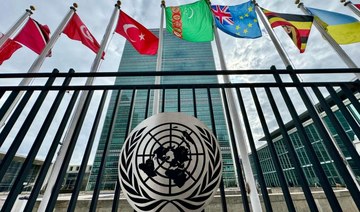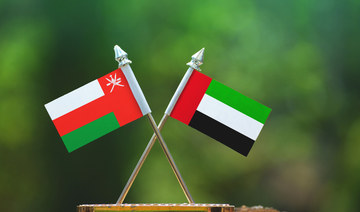SINGAPORE: At least two tankers have ferried Iranian fuel oil to Asia in recent months despite U.S. sanctions against such shipments, according to a Reuters analysis of ship-tracking data and port information, as well as interviews with brokers and traders.
The shipments were loaded onto tankers with documents showing the fuel oil was Iraqi. But three Iraqi oil industry sources and Prakash Vakkayil, a manager at UAE shipping services firm Yacht International Co, said the papers were forged.
The people said they did not know who forged the documents, nor when.
The transfers show at least some Iranian fuel oil is being traded despite the reimposition of sanctions in November 2018, as Washington seeks to pressure Iran into abandoning nuclear and missile programmes. They also show how some traders have revived tactics that were used to skirt sanctions against Iran between 2012 and 2016.
"Some buyers...will want Iranian oil regardless of U.S. strategic objectives to deny Tehran oil revenue, and Iran will find a way to keep some volumes flowing," said Peter Kiernan, lead energy analyst at the Economist Intelligence Unit.
While the United States has granted eight countries temporary waivers allowing limited purchases of Iranian crude oil, these exemptions do not cover products refined from crude, including fuel oil, mainly used to power the engines of large ships.
Documents forwarded to Reuters by ship owners say a 300,000 tonne-supertanker, the Grace 1, took on fuel oil at Basra, Iraq, between Dec. 10 and 12, 2018. But Basra port loading schedules reviewed by Reuters do not list the Grace 1 as being in port during those dates.
One Iraqi industry source with knowledge of the port's operations confirmed there were no records of the Grace 1 at Basra during this period.
Reuters examined data from four ship-tracking information providers - Refinitiv, Kpler, IHS Markit and Vessel Finder - to locate the Grace 1 during that time. All four showed that the Grace 1 had its Automatic Identification System (AIS), or transponder, switched off between Nov. 30 and Dec. 14, 2018, meaning its location could not be tracked.
The Grace 1 then re-appeared in waters near Iran's port of Bandar Assaluyeh, fully loaded, data showed. The cargo was transferred onto two smaller ships in UAE waters in January, from where one ship delivered fuel oil to Singapore in February.
Shipping documents showed about 284,000 tonnes of fuel oil were transferred in the cargoes tracked by Reuters, worth about $120 million at current prices.
Officials at Iran's oil ministry declined to comment.
Singapore customs did not respond to requests for comment.
The Grace 1, a Panamanian-flagged tanker, is managed by Singapore-based shipping services firm IShips Management Pte Ltd, according to data. IShips did not respond to several requests for comment via email or phone.
A Reuters reporter visited the office listed on IShips' website but was told by the current tenant that the company had moved out two years earlier.
The ship-tracking data analysed by Reuters showed the Grace 1 emerged from the period when it did not transmit its location almost 500 kilometres south of Iraq. It was close to the Iranian coast with its draught - how deep a vessel sits in water - near maximum, indicating its cargo tanks were filled.
The Grace 1 transferred its cargo to two smaller tankers between Jan. 16 and 22 in waters offshore Fujairah in the UAE, data showed.
One of those vessels, the 130,000 tonne-capacity Kriti Island, offloaded fuel oil into a storage terminal in Singapore around Feb. 5 to 7. Reuters was unable to determine who purchased the fuel oil for storage in Singapore.
The Kriti Island is managed by Greece's Avin International SA.
The tanker was chartered by Singapore-based Blutide Pte for its voyage to Singapore, Avin International's Chief Executive Officer George Mylonas told Reuters. Mylonas confirmed the Kriti Island took on fuel oil from the Grace 1.
There is no indication that Avin International knowingly shipped Iranian fuel oil. Mylonas said his firm had conducted all necessary due diligence to ensure the cargo's legitimate origin.
Mylonas emailed Reuters a copy of a Certificate of Origin (COO) that he said was provided by the charterers – referring to Blutide - showing the Grace 1 loaded fuel oil at Basra on Dec. 10 and 12, 2018.
"The Certificate of Origin and all the information obtained did not reveal any connection with Iran, let alone that the cargo of fuel oil originated" from there, Mylonas wrote.
Mylonas said the Grace 1's owners, managers, shippers, receivers and charterers were screened by Avin International. "There were not circumstances that would make the COO of dubious origin," he said via email.
He said he had been told by the charterers that the Grace 1 only stopped in waters off Iran in late December and early January for "repairs of damaged diesel generators" before sailing to Fujairah.
The document provided by Mylonas says Iraq's state oil marketer SOMO certified the Grace 1 in December loaded a total of 284,261 tonnes of Iraqi fuel oil.
Reuters shared the document with a SOMO official in Iraq who said it was "faked" and "completely wrong". The official declined to be identified by name, citing the marketer's communications policy.
Two other Iraqi oil industry sources with direct knowledge of Basra port and oil industry operations also said the documentation was forged.
The two sources said the document bore the signature of a manager who was not working at Basra port on the stated dates. The document also bears contradictory dates: It indicates a loading period of Dec. 10 and 12, 2018 but a sign-off date for the transaction of Jan. 12, 2018.
Data showed the second tanker into which the Grace 1 transferred cargo was the Marshal Z, also a 130,000-tonne vessel.
It was bound for Singapore in the first half of February but changed course on Feb. 15, parking off western Malaysia. Reuters was unable to determine who owns the Marshal Z, nor who chartered it.
Around Feb. 25, the Marshal Z transferred its cargo to another vessel called the Libya, owned and managed by Tripoli-based General National Maritime Transport Company (GNMTC).
A GNMTC spokesman said the Libya was chartered by Blutide, the same Singapore firm that chartered the Kriti Island.
Blutide registered as a company in Singapore on May 14, 2018. Its sole listed shareholder and only director, Singaporean Basheer Sayeed, said by telephone on Feb. 7 he was retired and not in a position to comment on the company's activity.
The Libya's owner GNMTC "was not aware, at any stage that the cargo is linked in any way to Iran," the company's spokesman said via email.
GNMTC provided Reuters with a copy of a COO that it said was issued by shipping services company Yacht International, based in Fujairah, showing the Marshal Z loaded Iraqi-origin fuel oil during a ship-to-ship transfer in UAE waters on Jan. 23.
However, Yacht International shipping manager Prakash Vakkayil said in an email his firm did not issue the certificate and "considers it to be forged".
The GNMTC spokesman did not respond to follow-up questions from Reuters.
Iran lays false trail to dodge US sanctions
Iran lays false trail to dodge US sanctions
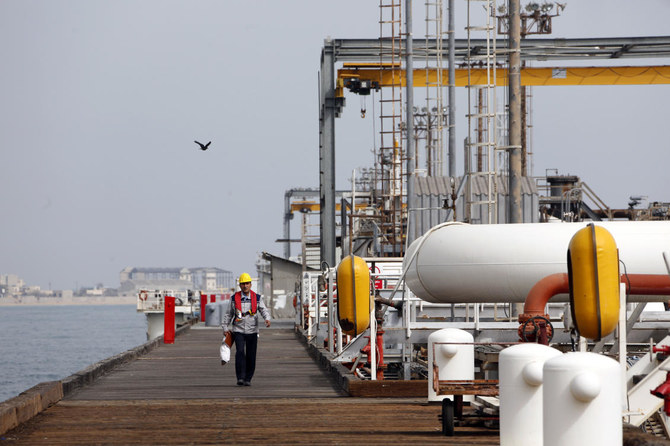
- Supertanker shipped fuel oil under forged Iraqi papers
- Ship not in Basra port during cited loading period
Closing Bell: TASI edges down to close at 12,254 points
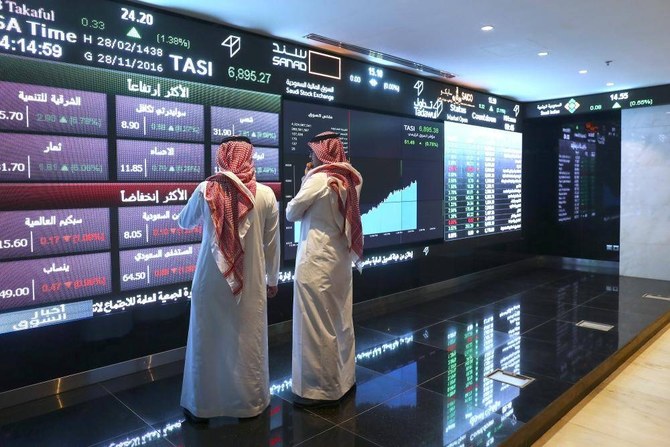
RIYADH: Saudi Arabia’s Tadawul All Share Index dipped on Thursday, losing 101.16 points, or 0.82 percent, to close at 12,254.53.
The total trading turnover of the benchmark index was SR6.9 billion ($1.84 billion) as 75 stocks advanced while 144 retreated.
Similarly, the MSCI Tadawul Index decreased by 8.99 points, or 0.58 percent, to close at 1,539.63.
The Kingdom’s parallel market, Nomu, increased, gaining 362.13 points, or 1.38 percent, to close at 26,688.25. This comes as 34 stocks advanced while as many as 27 retreated.
The best-performing stock of the day was Fawaz Abdulaziz Alhokair Co. The company’s share price surged by 6.39 percent to SR11.32.
Other top performers include Etihad Atheeb Telecommunication Co. and Saudi Cable Co., whose share prices soared by 5.57 percent and 5.35 percent, to stand at SR125and SR74.8 respectively. National Metal Manufacturing and Casting Co. and Saudi Steel Pipe Co. also fared well.
The worst performer was Al Sagr Cooperative Insurance Co., whose share price dropped by 7.11 percent to SR33.30.
ACWA Power as well as Bawan Co., did not perform well as their share prices dropped by 6.87 percent and 5.78 percent to stand at SR420 and SR44, respectively.
On the announcements front, a general assembly of Bank AlJazira approved increasing the capital by SR2.05 billion, representing a 25 percent increase.
This growth will be achieved through the capitalization of a portion of the statutory reserves, granting one share for every four shares to strengthen the bank’s capital base and enable it to achieve its strategic objectives, according to Al-Ekhbariya.
Additionally, authorization was granted to the board of directors to distribute interim dividends on a semi-annual/quarterly basis for the fiscal year 2024. Approval was also given to the compensation and benefits policy for senior executives at Bank AlJazira.
Moreover, the profits of Banque Saudi Fransi rose to SR1.15 billion during the first quarter of 2024, a 7 percent increase compared to the same period in 2023, which stood at SR1.07 billion.
The bank attributed this growth to a rise in commission income by 27.5 percent, primarily due to higher returns on financing and investments. However, there was a slight decrease in net commission income by 0.3 percent due to an increase in specific commission expenses.
Additionally, total operating expenses decreased 6.2 percent, mainly due to a reduction in the provision for expected credit losses on loans and advances. This was partially offset by an increase in the provision for other financial assets and rising staff salaries and expenses.
On another note, the stock of Al-Rajhi Co. for Cooperative Insurance SJSC, Al Rajhi Takaful, which is counted for in the insurance sector on the main market, recorded its highest price since listing on April 25, at SR142.
Furthermore, Saudi Exchange approved the listing request for government debt instruments issued by Saudi Arabia, totaling SR5.1 billion.
These instruments comprise issuance number 2024-04-07, valued at SR1.6 billion, and 2024-04-12, valued at SR3.5 billion. Trading of these instruments will commence on April 29.
Additionally, Rawabi Holding Co., also referred to as Rawabi, has successfully concluded its largest Saudi Riyal-denominated sukuk issuance, totaling SR1.2 billion. Driven by high market demand, this milestone surpasses Rawabi’s previous issuance record of SR875 million in 2023.
Since the launch of its sukuk program in 2020, Rawabi Holding has issued approximately SR6.5 billion across 18 tranches and redeemed seven tranches totaling around SR2.9 billion.
Rapid expansion of batteries crucial to meet COP28 climate goals: IEA
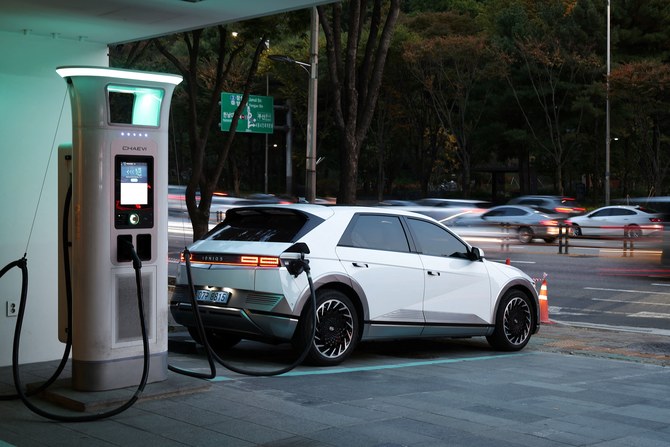
RIYADH: Global battery production must be scaled up to meet the climate security goals set at COP28, according to the International Energy Agency.
In its latest report, IEA said battery technology witnessed unprecedented growth in 2023, outstripping almost all other clean power source solutions.
The think tank added that an expected sharp fall in battery costs will accelerate the shift to renewable energy from fossil fuels in the coming years.
“Growth in batteries outpaced almost all other clean energy technologies in 2023 as falling costs, advancing innovation and supportive industrial policies helped drive up demand for a technology that will be critical to delivering the climate and energy targets outlined at the COP28 climate conference in Dubai,” said IEA in the report.
It added: “After their deployment in the power sector more than doubled last year, batteries need to lead a sixfold increase in global energy storage to enable the world to meet 2030 targets.”
During the COP28 summit, nearly 200 countries agreed to triple renewable energy capacity by 2030, double the pace of power source efficiency improvements, and transition away from fossil fuels.
The report added that 1,500 gigawatts of battery storage would be required to triple renewable capacity globally by the end of this decade.
However, IEA warned that a shortfall in deploying enough batteries could stall clean energy transitions in the power sector.
Battery manufacturing
According to IEA, battery manufacturing has more than tripled in the last three years, with China accounting for 83 percent of current production capacity, up from 75 percent in 2020.
The report added that 40 percent of announced plans for new battery manufacturing are in advanced economies such as the US and EU.
“If all those projects are built, those economies would have nearly enough manufacturing to meet their own needs to 2030 on the path to net zero emission,” said IEA.
In the earlier days, the most common type of batteries, those based on lithium-ion, were typically associated with consumer electronics. However, today, the energy sector accounts for over 90 percent of overall battery demand, said the report.
The intergovernmental organization added that battery deployment in the power sector increased by more than 130 percent in 2023 compared to the previous year, adding a total of 42 GW.
Moreover, batteries have enabled electric car sales to surge from 3 million in 2020 to almost 14 million last year in the transport sector.
Earlier in April, another report by IEA revealed that global sales of electric cars grew by approximately 25 percent in the first quarter of this year compared to the same period in 2023.
“The electricity and transport sectors are two key pillars for bringing down emissions quickly enough to meet the targets agreed at COP28 and keep open the possibility of limiting global warming to 1.5 degrees Celsius, ” said Fatih Birol, IEA’s executive director.
He added: “Batteries will provide the foundations in both areas, playing an invaluable role in scaling up renewables and electrifying transport while delivering secure and sustainable energy for businesses and households.”
Falling costs
According to IEA, battery costs have fallen by over 90 percent in less than 15 years, one of the fastest declines ever seen in clean energy technologies.
However, the agency highlighted that costs must come down further without compromising quality and technology.
“The combination of solar PV (photovoltaic) and batteries is today competitive with new coal plants in India. And just in the next few years, it will be cheaper than new coal in China and gas-fired power in the US. Batteries are changing the game before our eyes,” said Birol.
According to IEA, ensuring energy security also requires greater diversity in supply chains, including extracting and processing the critical minerals used in batteries.
Birol noted that governments worldwide have an important role in building resilient local and international supply chains to ensure that securely and sustainably produced batteries come to market at a reasonable cost.
“Legislation such as the Inflation Reduction Act in the US, the Net-Zero Industry Act in the EU, and the Production Linked Incentive in India are good examples of how policy can affect real change in the industry by backing technology manufacturing,” said Birol.
He also underscored the necessity to implement supportive policies to help speed up deployment by minimizing barriers to market entry for developers and reducing red tape that can stifle new projects.
Key to energy transition
In its report, IEA also highlighted the versatility of battery storage to ensure clean energy transition.
“In the power sector, batteries help smooth out the variability of renewable electricity from technologies such as wind and solar,” said the agency.
IEA added that battery storage can alleviate grid congestion in times of high supply, offering an outlet to capture and store excess renewable electricity that would otherwise be lost.
“Reducing emissions and getting on track to meet international energy and climate targets will hinge on whether the world can scale up batteries fast enough. More than half the job that we need to do will rely, at least in some part, on battery deployment,” added Birol.
Moreover, batteries can also provide critical service in the case of emergencies caused by extreme weather or other disruptions.
The deployment of batteries will also provide the grid with highly technical services, such as voltage and frequency control, that can help system operators and provide access to people who lack electricity.
“In a pathway to achieving universal energy access worldwide by 2030, they help 400 million people in emerging and developing economies gain electricity access through decentralized solutions like solar home systems and mini-grids with batteries,” IEA concluded.
More than two-thirds of UAE retail investors hold stocks in AI companies: eToro survey

RIYADH: More than 70 percent of retail investors in the UAE have stocks of companies developing artificial intelligence, according to a survey by trading platform eToro.
The 71 percent mark underscores a widespread understanding of AI’s potential as a catalyst for innovation and a source of competitive edge.
UAE retail investors’ interest in AI goes beyond holding stocks. When asked about their use or plans to use AI tools like ChatGPT to guide investment decisions, 39 percent reported that they already employ these technologies.
Global Markets Strategist at eToro, Ben Laidler, said: “Microsoft’s recent $1.5 billion investment in Abu Dhabi’s G42 is a big endorsement of the UAE’s potential as a global AI hub, which is reflected in the survey results showing widespread AI adoption by local investors and consumers.”
Millennials lead the charge when it comes to generational users, with 40 percent of those aged 25-44 using AI tools.
Baby Boomers and Gen X investors follow closely, with 39 percent and 38 percent, respectively.
Underlining the critical role that artificial intelligence might play in future investment strategies, an additional 52 percent of respondents, beyond those already using AI tools, said they are willing to adopt the technology to guide or adjust their portfolios in the future.
This trend defies generational stereotypes, with the older cohorts of investors directing the charge.
Baby Boomers lead in interest in integrating AI into investment planning, with 60 percent showing enthusiasm, followed by Gen X at 58 percent.
Laidler said: “AI stocks were the performance juggernauts of 2023, leading the tech sector revival and propelling the S&P 500 into bull market territory. AI trends helped make NVIDIA and Meta the best S&P 500 stock performers of last year, with their share prices tripling.”
He added: “Whilst we’re unlikely to see a repeat performance in 2024, the benefits of AI’s rapid adoption are broadening across the stock market and economy as it rapidly moves from hype to reality.”
Furthermore, eToro analyzed which companies experienced the highest proportional increase in UAE-based investors on its platform from quarter to quarter, revealing that AI stocks were the most popular theme during the first three months of the year.
Omani officials forge economic alliances with Saudi Arabia, Japan, and US
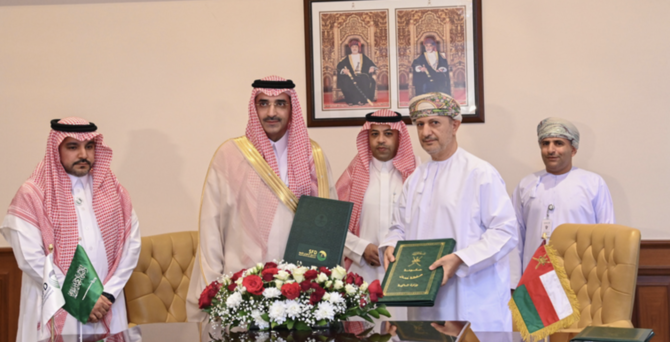
RIYADH: Oman’s industrial infrastructure is set to receive a boost following a new agreement with Saudi Arabia, fostering private sector participation in the country’s economic growth.
A memorandum of understanding, aimed at financing the infrastructure of several industrial zones in Oman, was signed during a meeting between Minister of Finance Sultan bin Salem Al-Habsi and Sultan Abdulrahman Al-Marshad, CEO of the Saudi Fund for Development, the Oman News Agency reported.
Discussions centered on cooperation mechanisms between Oman and the fund, along with updates on collaborative development projects.
The aim is to develop the industrial and logistical sectors by providing all necessary basic services, thereby encouraging the private sector to contribute to Oman’s economic development in line with Oman Vision 2040, as reported by the agency.
This memorandum falls within the framework of cooperation between the two parties to support developmental areas in Oman. These encompass infrastructure, higher and vocational education programs, and water, along with the industry and mining sectors. Additionally, it includes transportation and communications sectors, as well as developmental projects in the energy sector.
On another note, Ali bin Masoud Al-Sunaidi, chairman of the Public Authority for Special Economic Zones and Free Zones, met with Ken Saito, minister of economy, trade and industry of Japan, and his accompanying delegation in Tokyo.
During the meeting, they reviewed the business cooperation between the two countries and the major projects under construction in the economic and free zones and industrial cities in Oman, notably the low-carbon iron production project in the Special Economic Zone in Duqm.
The visit also included meetings with officials from companies engaged in iron and its derivatives production, and renewable energy equipment manufacturing companies, as well as a visit to Yokohama Port to learn about its experience in receiving ships specialized in energy and petroleum product transportation.
Also on April 24, Oman and the US explored ways to enhance trade, investment, and address challenges comprehensively during the second strategic dialogue held in Washington.
The Omani side was chaired by Sheikh Khalifa bin Ali bin Issa al-Harthy, undersecretary for Diplomatic Affairs, Ministry of Foreign Affairs, while the US side was chaired by Jose Fernandez, undersecretary of state for Economic Growth, Energy, and the Environment.
Both sides discussed opportunities for American companies in Oman, focusing on ICT, semiconductors, and clean energy services, expressing commitment to enhancing cooperation in clean energy solutions and mineral investments.
They addressed environmental priorities under the Omani-American cooperation memorandum, fostering communication between researchers from both countries for clean energy research.
Saudi NHC, Spain’s Urbas to construct almost 600 housing units in Al-Fursan suburb
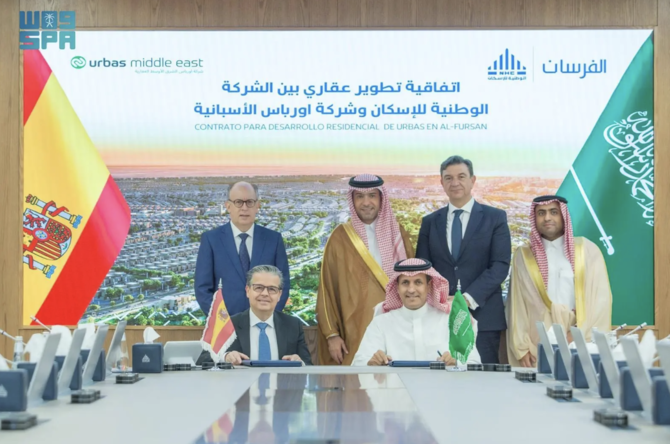
RIYADH: Saudi Arabia’s Al-Fursan suburb will soon be home to 589 new residential units worth around SR1 billion ($266 million) thanks to a deal sealed by the National Housing Co.
Inked with Urbas Middle East Real Estate Co., a subsidiary of the Spanish Urbas Group, the agreement involves the development as well as construction of the housing units on an area spanning 150,000 sq. m, the Saudi Press Agency reported.
This collaboration marks a significant milestone in the development of the Al-Fursan suburb. It also promises to set new standards in property development.
“This agreement complements the efforts of the recent visit to Spain and continues to attract international investments with major companies to provide various housing products that fulfill and meet the desires of citizens,” Saudi Minister of Municipal and Rural Affairs and Housing Majid Al-Hogail said in a post on X.
“As an extension of our journey in attracting the best international experiences and expertise in the real estate development industry, I was pleased to meet the CEO of the Spanish company Urbas, which is planned to be one of the companies developing the Al-Fursan neighborhood project in Riyadh,” Al-Hogail added.
The minister also highlighted how this step will contribute to providing innovative housing options and facilitate the exchange of experiences between Saudi and international developers.
Moreover, NHC has also revealed the sale of 1,300 residential units within Al-Fursan in the first quarter of 2024, generating a total value exceeding SR1.5 billion.
This accomplishment emphasizes the firm’s keenness in creating vibrant, quality living spaces that meet and exceed the expectations of modern residents.
Al-Fursan, known as one of the largest urban development projects in the region, is designed to align with the Kingdom’s Vision 2030.
The suburb covers an area of 35 million sq. m. and is set to feature over 50,000 housing units, accommodating more than 250,000 residents.
It is equipped with over 190 crucial facilities, including educational, healthcare, and recreational services, all surrounded by more than 6 million sq. m. of green spaces. This widespread greenery is part of a broader initiative to further elevate the living environment and contribute to the Saudi Green Initiative by planting over half a million trees.
Urbas Group has experience in over 20 countries with 30,000 residential units. Urbas Middle East plans to grow in Saudi Arabia, showing its commitment to global expansion.





